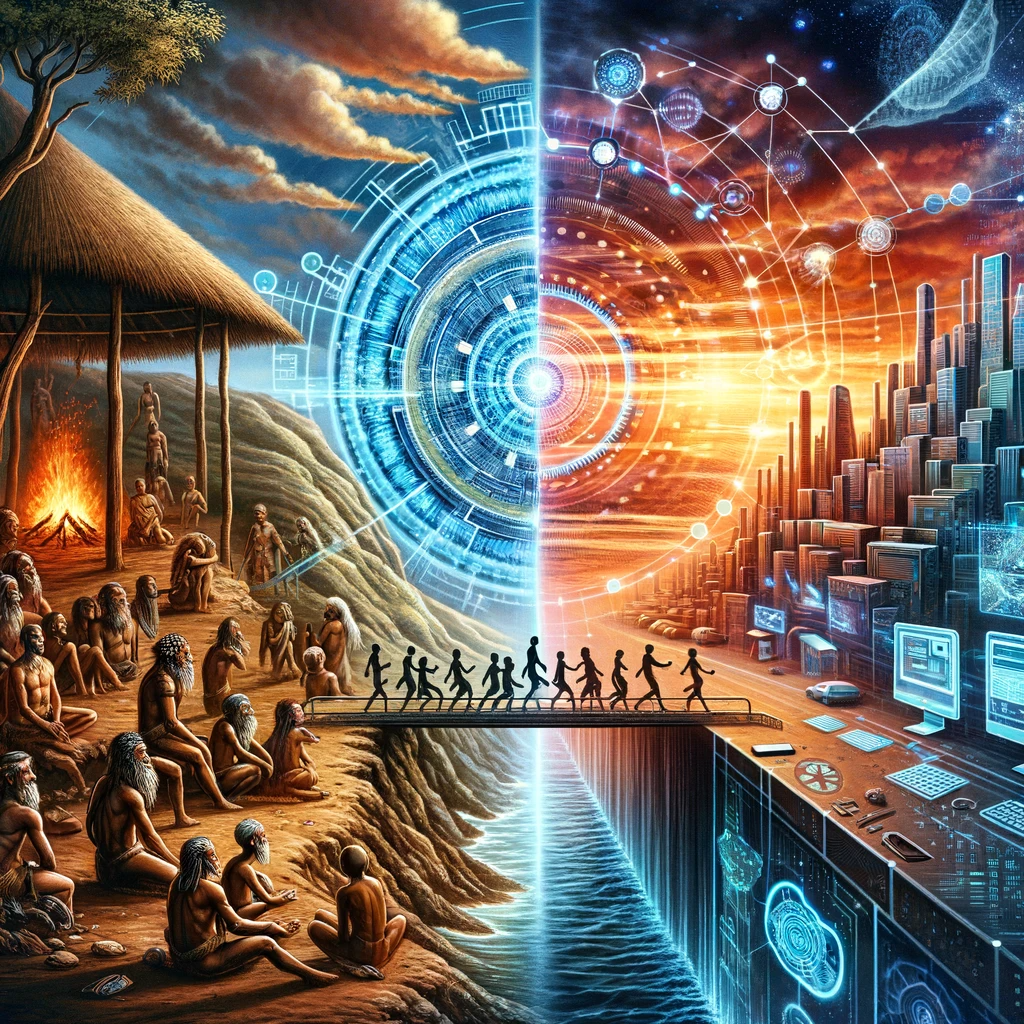INTELLIGENCE TO REINVENT TRUST
17 Dec

- From Ancestral Trust to the Current Situation
In the early chapters of human civilization, trust had almost nothing to know or doubt. It resided in small circles of kinship and very close relations in families, clans, and tribes. In these united ancestral communities, trusting was as natural as breathing. Trust was built with face-to-face interactions, shared experiences, and mutual dependencies. Breaking the word given could mean social ostracism or worse. It was a form of personal trust that was direct and gradually intertwined with the rhythm of daily life.
However, as societies grew, the complexity of trust also increased. The advent of agriculture and the consequent sedentary lifestyle led to larger communities and the advent of the nation-state. With such expansion, the need for intermediaries—notaries, banks, and legal systems—arose to mediate and formalize trust among strangers. The intimacy of kinship trust has evolved into a more impersonal and institutionalized form. Although these intermediaries facilitated broader interactions and more complex social structures and exchanges, they also introduced layers of bureaucracy and a growing sense of alienation. Moreover, when an intermediary or agent acts on behalf of another, there are extra expenses, inefficiencies, and even conflicts of interest that cause a reduction in the overall efficiency and reliability of transactions.
This change marked a significant transformation in how trust was managed and distributed. If our ancestors came to visit us today, they would find technology astonishing but many other things horrifying. Indeed, it is precisely technology that can and should catapult us to the next level in the evolution of trust.
- Return to the Technological Future of Ancient Trust
We entered the 21st century with an accelerated and dazzling technological evolution. Still, which urgently needs to be understood politically, the emergence of blockchain technology and artificial intelligence (AI) represents an unmissable opportunity to recover ancestral trust globally. Faced with novelties like Bitcoin and ChatGPT, even in the 21st century, we are as amazed as perplexed or even scared (the younger ones, less so), but the truth is that the new paradigm of ‘distributed trust reinforced by AI’ allows us to reinvent with cutting-edge technology a principle of direct trust between people almost lost in the mists of time.
At their core, blockchain networks are distributed ledger systems that record virtually impossible-to-counterfeit or tamper-with transactions. This technology provides undeniable proof of the word given in a transaction or contract (making them “smart contracts”). It resembles a digital notary, as incorruptible as mathematics, transparent, and capable of operating without a central authority. When combined with AI’s predictive capabilities and analytical precision, this technology resurrects the trust of yore. It allows it to be distributed fairly and equitably in the modern ‘global village’. Indeed, in the face of growing distrust in society, ignoring this new reality is equivalent to letting humanity perish on the shore.
- The Power of Distributed Trust
This new distributed trust, once AI-powered, has even more significant and far-reaching implications for business, trade, and interpersonal relationships (in that order). In finance, it introduces currencies and other digital assets that can be as decentralized as desired. In commerce, it reduces transaction costs, uncertainty, and risk like never before; each transaction and promise of exchanging goods and services can now be recorded, verified, and made trustworthy a priori. This transparency promotes security and reliability that traditional systems struggle to match. This is crucial for business and human relationships, as both have an aversion to uncertainty.
That’s why this reinvented trust can potentially harmonize our turbulent world. The ability to build trust on a global scale is more than just a technological achievement in an era of hostility and skepticism; it also serves as a bridge to understanding and friendship. By ensuring transaction transparency, we not only facilitate business but also prevent corruption, defend justice, and build trust—all of which are indispensable for creating community ecosystems.
Imagine a world where small entrepreneurs from different corners of the planet can do business with the same level of trust as if they were once trading in their small village. Imagine a world where the transparency of cryptographically enhanced transactions increases corporate responsibility and governmental ethics. With enough political will to decentralize blockchain networks and other distributed ledger technologies, AI will help civil society recover a more humane world.
Conclusion: A Future Based on Sharing Trust
At this crossroads of a new digital era where the information society is giving way to the knowledge society, the role of blockchain’s distributed trust reinforced by AI is decisive. By mixing the old with the modern, we are advancing technologically and recovering the essence of human connection. In this new world, technological development must parallel a sense of responsibility and a vision of a better and more sustainable planet, always remembering that our shared humanity is at the heart of all trust.
Dario Rodrigues


No comments yet